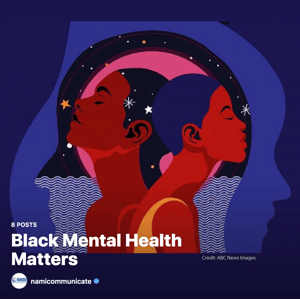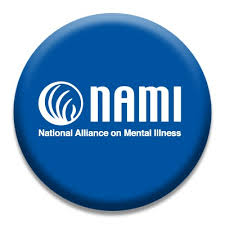 The intention of this guide is to spread awareness about the importance of Black mental health and to share some useful resources and mental health services available to the Black community.
The intention of this guide is to spread awareness about the importance of Black mental health and to share some useful resources and mental health services available to the Black community.
Cover art credit: ABC News
NO. 1
Barriers to Black Mental Health
Anyone can develop a mental health condition, but Black Americans face added challenges when it comes to their mental health and accessing quality mental health care.
Racial Trauma: Many in the Black community experience trauma from daily exposure to racism and discrimination. Tending to racial trauma is an essential part of mental health care.
Provider Bias: Unconscious and conscious bias causes some providers to misdiagnose those from the Black community or provide inadequate and not culturally competent treatment.
Learn more about the issues at NAMI.org/culturaldimensions.
NO. 2
Seeking Culturally Competent Care
It’s crucial that a person feels their identity is understood by their provider to receive the best support and care.
Questions to ask when looking for an anti‑racist provider:
Have you treated other Black people before?
Have you received training in cultural competence or on Black mental health?
How do you plan to integrate my beliefs and practices in my treatment?
Check out @InnoPscyh’s directory of clinicians of color.
NO. 3
The New Norm: Talking About Mental Health
To break the stigma/discrimination that surrounds mental health in the Black community, we need to talk about it. Mental illness is not a sign of weakness, but rather seeking help when you need it is a sign of strength.
Talking about mental health should be the norm.
NO. 4
Black Women’s Mental Health
Three ways you can prioritize your mental health as a Black woman with mental health challenges:
1. It’s ok to ask for help. You don’t need to carry your struggles alone.
2. Put your mental health first. Taking care of other people or things becomes much more achievable when you are well.
3. Protect your peace. Those who invalidate your struggle should not have a say in your care.
@TherapyForBlackGirls is full of resources for Black women, including gentle reminders like this one about how to optimize your mental health for your overall well‑being.
NO. 5
Black Men’s Mental Health
Black men are often told to “be strong” and “man‑up,” which makes it harder for them to seek out and access quality care. We need to reframe the message to, “strength still needs support,” as @TherapyForBlkMen says.
NO. 6
Black Students’ Mental Health
Many Black college and university students face discrimination, racial profiling and xenophobia at their schools. To fight this, colleges and universities should have a diverse staff and faculty, establish a zero‑tolerance policy to racist actions and create cultural supports for students of color. You can help by advocating for these supports and also check out the @TheSteveFund’s video toolkit to support the mental health of students of color.
NO. 7
Taking the Next Step: Share Your Story
If we are going to change the norm, we must raise our voices and speak out about the intersectionality of race and mental health. Share your story with us @ NAMI.org/yourstory
Thanks to NAMI Ambassador @thebrookej for always being willing to speak out.
NO. 8
Some More Helpful Resources
Here are just a few of the many folks on IG working on mental health in the Black community. More can be found at nami.org.
@SistaAfya provides mental wellness education, resource connection and community support for Black women.
@InclusiveTherapists has a directory of clinicians for all identities.
@QTPOCMentalHealth provides emotional support resources for LGBTQ2SIA+ & BIPOC communities.
@_BEAMOrg is aimed at removing the barriers that Black people experience getting access to or staying connected with emotional health care and healing. They do this through education, training, advocacy and the creative arts.
@MelaninAndMentalHealth connects individuals with culturally competent clinicians committed to serving the mental health needs of Black & Latinx/Hispanic communities.
@sadgirlsclub is driven by women of color who have created a community for GenZ & millennials.

